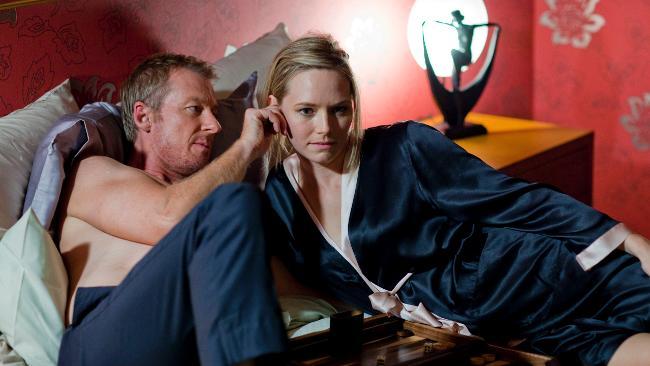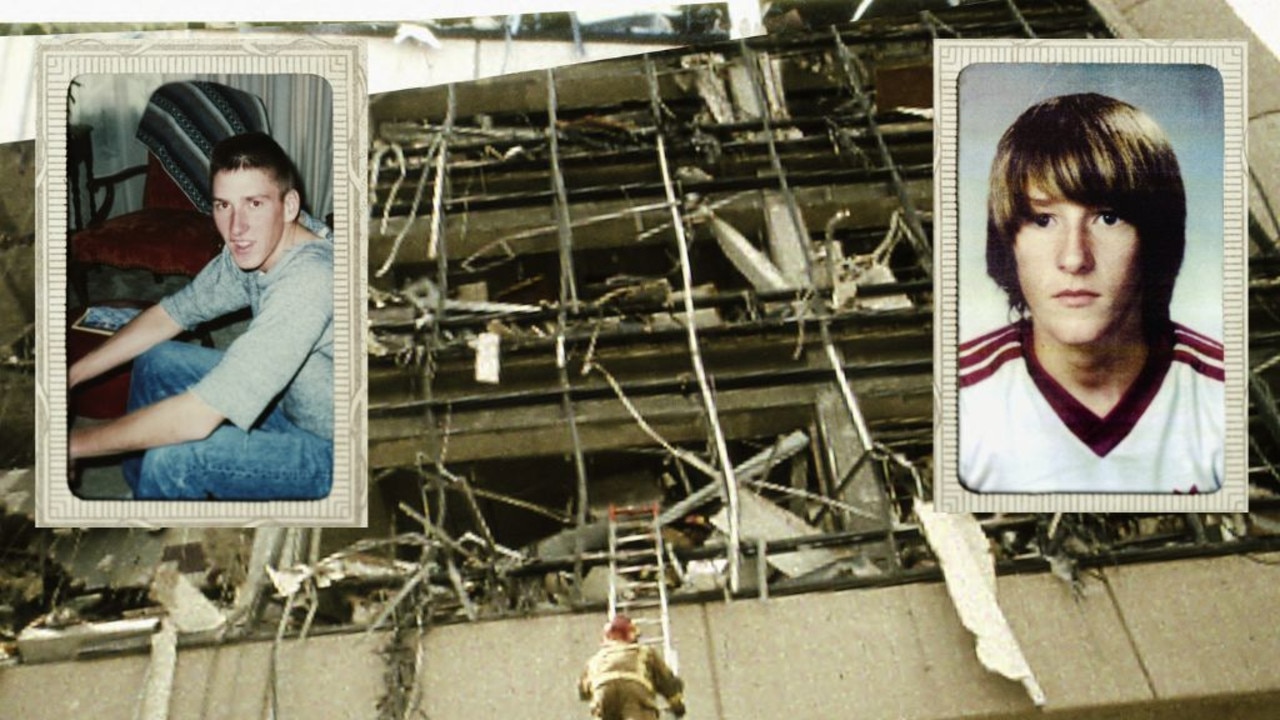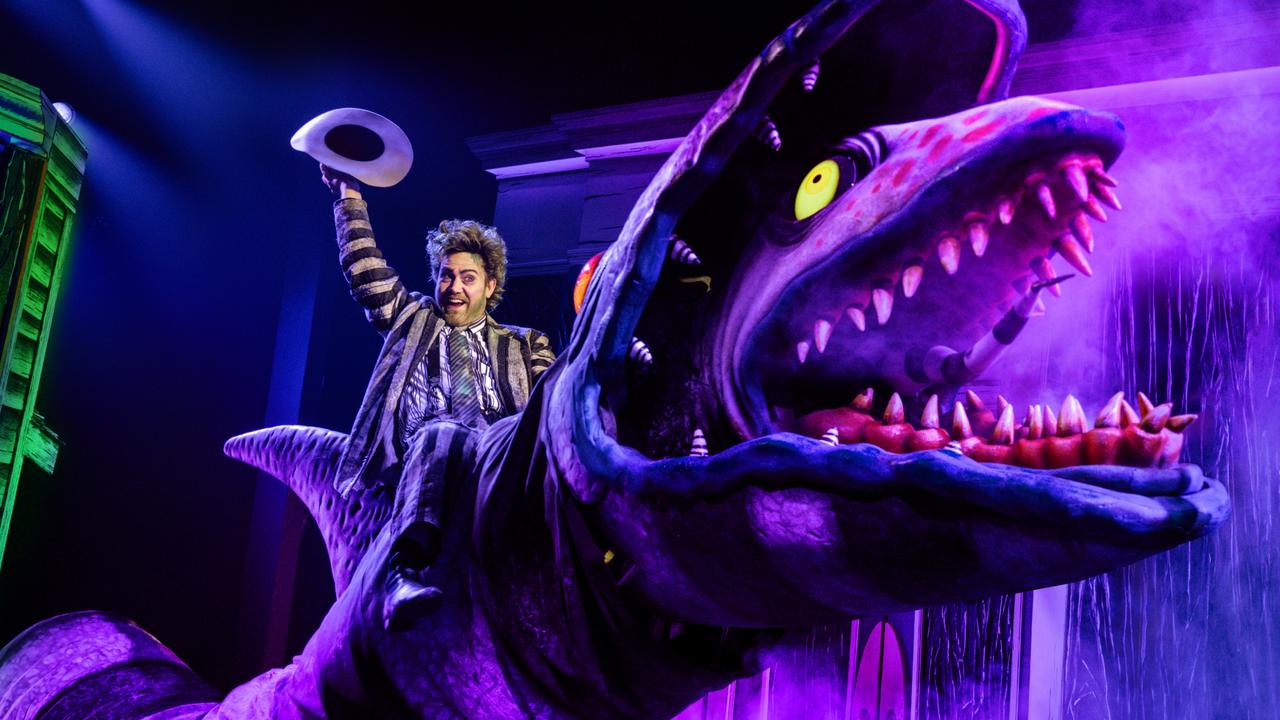A Rake's progress

Richard Roxburgh stars in a tough new criminal series that marks the ABC's return to quality drama
RICHARD Roxburgh is fascinating to watch, especially between takes, as he rehearses lines on the run for his next scene, swears constantly as memory evades him, teases and cajoles crew members, obviously unable to leave his character behind.
I'm sitting with director Peter Duncan on the set of Rake, the new ABC series in which Roxburgh plays emotionally and often physically bruised Sydney barrister Cleaver Greene. He's a lawyer who acts for those clients whose cases appear utterly hopeless, a man always on the wrong side of conventional wisdom, his energy kinetic and his charisma inescapable. Just like the actor.
We're in a Sydney restaurant on the harbour, surrounded by glittering luxury yachts and cruisers, the kind of fashionable place in which the predators of Cleaver's world like to display themselves. Now, however, a film crew is jammed together, jostling for breathing space.
Where many actors are still between takes, and often comatose between scenes (look closely and you'll find lead actors asleep somewhere on most film or television sets), the Rake star never stops moving. His pale ascetic face, fierce bluish eyes and tense, muscular body suggest a man easily gripped by obsession.
Duncan, who wrote the series with SeaChange's Andrew Knight and shares producer and co-creator credits with Roxburgh, is quietly in control, his method different from that of most TV directors. He's better known for his features (especially Children of the Revolution, which starred Geoffrey Rush and Judy Davis) and his film industry background is apparent. (He also directed and wrote the award-winning A Little Bit of Soul, the comedy with Rush and Frances O'Connor on the life of Percy Grainger, with Roxburgh and Barbara Hershey.) Duncan talks far more frequently to his director of photography, Bob Humphreys, about the set-ups for each scene than is usual, quietly conferring with him about angles and coverage.
In TV you're far likelier to see the director a step ahead of everybody, having already mentally storyboarded each scene, but Duncan is more convivial, collegial and open to suggestions than most.
"Hardly a spectator sport?" he says as we watch the crew setting up a scene in a long corridor filled with wine racks, Roxburgh muttering lines as he is made up. "I've got friends coming tonight who wanted to be extras in a scene; they'll be bored rigid in half an hour," Duncan continues. "No one outside this industry has any idea how tedious filmmaking can be."
He says he was a little reluctant to take on this project, even though he and co-writer Knight have been friends for more than 15 years. ("We're like a poor man's version of Elton John and Bernie Taupin," he says.) His hesitation to do TV was not because of any innate snobbishness but came from a concern about the speed with which TV is made, compared with films.
"Ten minutes a day of making TV drama compared [with] a comparative couple for a movie," he muses.
This day is the 10th of shooting and Duncan says he's growing into the pace and coping with the pressure.
"We were doing Gone with the Wind this morning; this afternoon we were making All Saints," he says with a laugh, though it's more a grim guffaw. But he seems to relish the pressure now he's well under way. "I find you're always behind schedule at lunchtime and you have to run out of the trenches for the rest of the day."
He need not worry; Rake is splendid TV and has all the cinematic polish and style the director is after. It marks a return to high-quality drama for the ABC, too, after several rather grim years. Classy, confronting drama is these days far likelier to appear on pay TV than on the publicly funded ABC.
At the start of the series, Cleaver Greene's life continues to spiral out of control. The first episode opens with him only just coping with his latest blow: the beating he receives for his unpaid gambling debts from Col (Steve Le Marquand), the brutish standover man for bookie Mick Corella (Richard Carter). The womanising Cleaver characteristically retreats to the arms of his lover, Missy (Adrienne Pickering), a high-class call girl who works at a brothel also frequented by Cleaver's friend, attorney-general Joe Sandilands (Geoff Morrell). Cleaver is precariously renting rooms in chambers and impecuniously living above the famous Piccolo Bar in Kings Cross, just down from what's left of the strip joints and drag shows and blue movie houses.
Each morning he takes his coffee there, wearing his dressing-gown and a pair of brogues, before venturing out into another day of saving lost souls. He's the lawyer everyone in jail would love to have but is never able to find.
There's more, too. He's behind in his son's school fees and formidable psychologist ex-wife Wendy (Caroline Brazier) is furious, as disappointed as always. Cleaver is also only just fending off an ongoing unpaid taxes case against him, unrelentingly pursued by barrister Harry David (Matt Day), always the straightest guy at the party.
His best friend, solicitor Barney (Russell Dykstra), the solid family man, presents Cleaver with an irresistible case: the defence of professor Graham Murray (Hugo Weaving), a world-renowned economist accused of murder and cannibalism.
But Missy, seeking another life, suddenly departs the kind patronage of Sydney's doyenne of brothel keepers. Cleaver is devastated. "It's like being in a Polanski movie," he says of his life.
Duncan gives us an elegantly paced comedy of rather bad manners, which is also an off-beat character study and a seemingly unfolding relationship drama. He wraps these up in a rather ironic narrative that echoes the legal thriller and the courtroom drama, gently parodying both.
It's all highly intelligent, rather knowing and urbane, with the kind of amusing political humour we haven't seen at the ABC since Geoffrey Atherden's brilliant Grass Roots. (Rob Sitch and Working Dog's satirical Hollowmen was far scarier altogether, in retrospect too accurate a portrayal of the Rudd era to be really funny.)
But Duncan, a lawyer himself, is a benevolent humorist, not a bitter satirist, and the jokes are digs rather than barbs, asides rather than assaults on the law or the moral state of politics in NSW. Green is really too louche and alienated to care about little more than surviving another day without being beaten by his bookie again, jailed by the tax department or being able to play backgammon with his girlfriend. His feet of clay are large indeed.
He's in a long line of hard-boiled heroes wandering the ambiguity between institutionalised law enforcement and true justice. (Duncan calls him "the character of the busted lawyer".) But he's not only a figure outside the process of the judiciary, while still only just accepted within it, he's the paradoxical embodiment of a man of character who is also a failure.
Roxburgh delivers a highly attractive and often amiable personification of flawed middle-aged maleness, biting off his words, just holding self-loathing at bay and giving into whimsy like a child who will never grow up. The character brings out all the actor's knotty complexity. The strong, tough side of the trickster Cleaver, his ear for the street and eye for the con, is constantly undercut by emotion and a curious vulnerability that seems to catch even the actor by surprise.
He never stops banging his head against the futility of human efforts and the inertia of evil. "The reason I get my low-life crooks off, is because I care about the law; it's justice I don't give a toss about," he says. He persists in, and insists on, hoping that his life will somehow work out and that his often bizarre struggles to find some truth will at least temporarily grant some significance to the way he lives.
The supporting cast is brilliant, too, especially Morrell as attorney-general Sandilands, a snarling Machiavelli, and Pickering as Missy, acute intelligence always present behind the mischief in her eyes. And Weaving does a stunning virtuoso turn as the cannibalistic economist, few actors so capable of turning dialogue into speech with such theatrical relish.
WHEN it comes to assumptions, inferences, speculation and supposition, no one in the documentary world has more insight than award-winning filmmaker Peter Butt of The Prime Minister is Missing and Who Killed Dr Bogle & Mrs Chandler? And few directors are so astutely able to dramatise crucial moments of change in our social narrative with such cinematic verve.
In his new dramatised documentary feature I, Spry Butt transports us back to the Cold War, that conflict of deception and intrigue, and the space in history that spies called "a wilderness of mirrors". It was, in retrospect, a wonderfully colourful time when the alphabetic runes concealing the clandestine espionage organisations of the main contestants -- CIA, KGB, MI5 and ASIO -- became household words.
It's the story of Colonel Charles Spry (wonderfully portrayed by Tony LLewellyn-Jones), appointed by prime minister Robert Menzies in 1949 to head the fledgling ASIO. The anti-communist, fifth-generation soldier recruits new officers to investigate Australians spying for the Soviets and to infiltrate Communist Party branches.
Based on recently declassified information, including Spry's secret testimony at the 1974 Royal Commission into Intelligence and Security, Butt colourfully documents the way ASIO evolved from a bumbling group of amateur spies into a subversive organisation beyond government scrutiny.
The film points to the wonderful irony that the greatest risk to Australian security during the alcoholic Spry's reign was not inside the universities, media or even the Communist Party but lurked within ASIO itself. Its agents and leaders lost their ability to differentiate between means and ends, and became mirror images of the enemies they opposed.
Butt, as he always does, opens up many secrets, revelling in political and ethical ambiguities, but always using arresting dramatic principles to tell his stories. He is a superb maker of films. His work is always characterised, like that of all good biographers, by quizzicality, quirkiness and moments of odd poetry.
"It comes from opening one door with one document and then another opens -- there is no end to the trail -- and eventually you see the web come together," he says of his method. "But I also have pages and pages of documents that are all black, still censored; one of the problems with researching this film was that so many of my sources are still locked up inside safes somewhere."
He blends candid interviews with former intelligence officers and historians with archival and ASIO surveillance films, Weaving's authoritative voiceover providing just the right notes of irony and gentle sarcasm.
But it's the wonderful re-enactments, superbly photographed by Calvin Gardiner and costumed by Beverley Freedman, that so deftly carry his narrative, the dialogue sourced from letters, tape recordings and interviews.
Most of the acting roles are played by a large cast of Russian expatriates, including the delicious singer Maria Okunev and her violinist sister Anna. Their musical performance in the re-created Russian Club at Sydney's Petersham Town Hall is a highlight.
I often get the feeling with Butt's films that he falls a bit in love with his actors and his milieus, the way documentary directors who turn to features often do. And, because of it, his filmmaking is all the more captivating.
Rake, Thursday, 8.30pm, ABC1.
I, Spry, Thursday, 9.25pm, ABC1.


